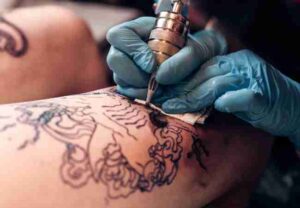Have you ever wondered if caffeine can affect your tattoo? Well, you’re not alone. Many tattoo enthusiasts are curious about how their favorite beverage may interact with their ink. In this article, we’ll dive into the truth about caffeine and its impact on your tattoo.
While coffee and energy drinks have become an integral part of our daily routine, it’s important to understand the potential effects they may have on your tattooed skin. Some believe that caffeine can fade or distort tattoo ink, while others argue that it has no significant impact. So, what’s the truth?
In a quest to unravel this mystery, we will explore the scientific evidence surrounding the relationship between caffeine intake and tattoo longevity. We will also discuss the factors that contribute to the preservation or deterioration of tattoo pigments over time.
With accurate information and insights from experts in the field, we aim to provide you with a comprehensive understanding of how caffeine may affect your tattooed skin. So grab a cup of joe, get comfortable, and join us as we unveil the truth about caffeine’s interaction with your tattoo.
How caffeine affects the skin and its impact on tattoo healing
Tattoos are more than just beautiful works of art; they are intricately designed pigment deposits injected into the dermis, the second layer of the skin. The ink used in tattoos consists of various pigments suspended in a carrier solution. These pigments are designed to be permanent, but their interaction with the body can influence their appearance over time.
Once the tattoo needle penetrates the skin, it delivers the ink into the dermis. The immune system recognizes the foreign particles and sends specialized cells called macrophages to engulf them. However, not all pigments are easily broken down and eliminated by the immune system, leading to the long-lasting nature of tattoos.
It’s important to note that tattoo pigments can vary in composition, with some containing heavy metals or organic compounds. These variations can impact the tattoo’s stability and response to external factors such as caffeine consumption. Understanding the composition of tattoos is essential to grasp how caffeine may interact with them.

The role of caffeine in altering the appearance and longevity of tattoos
Caffeine is a stimulant that affects the central nervous system, providing a boost in energy and alertness. When consumed, it can have various effects on the body, including the skin. Caffeine acts as a vasoconstrictor, meaning it narrows blood vessels and reduces blood flow to the skin. This can have implications for tattoo healing.
During the tattoo healing process, blood flow is crucial for delivering oxygen and nutrients to the area, aiding in the regeneration of damaged skin cells. Restricted blood flow caused by caffeine consumption can potentially hinder the healing process.
It’s important to note that while moderate caffeine consumption may not have a significant impact, excessive caffeine intake can prolong healing or even lead to complications.
Furthermore, caffeine is a diuretic, meaning it increases urine production and can potentially dehydrate the body. Proper hydration is essential for healthy skin, and dehydration can negatively affect the healing of tattoos.
It’s crucial to maintain adequate hydration, especially when consuming caffeine, to support the healing process and prevent any adverse effects on the tattooed skin.

Common misconceptions about caffeine and tattoos debunked
One of the most common concerns among tattoo enthusiasts is whether caffeine consumption can fade or distort their ink. While there is limited scientific research specifically addressing this topic, anecdotal evidence suggests that caffeine may play a role in altering the appearance and longevity of tattoos.
Caffeine’s vasoconstrictive properties, as mentioned earlier, can affect blood flow to the skin and potentially impact the vibrancy of tattoo pigments. Reduced blood flow may lead to a duller appearance over time.
However, it’s important to note that the impact of caffeine consumption on tattoo appearance can vary depending on individual factors such as overall health, skin type, tattoo location, and the quality of the tattoo itself.
Additionally, excessive caffeine consumption can disrupt sleep patterns, which in turn can affect the body’s ability to regenerate and repair cells. Adequate rest is essential for maintaining healthy skin, and any disruptions in sleep can potentially impact the longevity of tattoos.
Tips for managing caffeine consumption to protect your tattoos
There are several common misconceptions surrounding the interaction between caffeine and tattoos. Let’s debunk some of these myths to provide a clearer understanding of the topic.
- Myth 1: Caffeine will immediately ruin your fresh tattoo.
- While excessive caffeine consumption during the healing process can potentially hinder the tattoo’s healing, moderate caffeine intake is unlikely to cause immediate damage. It’s important to follow proper aftercare instructions provided by your tattoo artist and consult with them regarding any concerns.
- Myth 2: Caffeine will make your tattoo fade overnight.
- Tattoo fading is a gradual process influenced by various factors, including exposure to sunlight, aging, and individual skin characteristics. While caffeine’s vasoconstrictive properties can potentially impact blood flow and contribute to fading over time, it is unlikely to cause overnight fading.
- Myth 3: Caffeine will completely distort your tattoo’s appearance.
While caffeine can potentially impact the appearance of tattoos, the extent to which it affects individual tattoos varies. Factors such as tattoo quality, pigments used, and overall skin health play a significant role in determining the impact of caffeine on the tattoo’s appearance. Moderate caffeine consumption is unlikely to cause significant distortion.
Other factors that can affect tattoo healing and appearance
If you’re concerned about the potential impact of caffeine on your tattoos, here are some tips to help you manage your caffeine consumption while protecting your ink:
- 1. Moderation is key: Keep your caffeine intake moderate to avoid excessive vasoconstriction and potential complications during the healing process.
- 2. Stay hydrated: Proper hydration supports healthy skin and aids in the healing process. Drink plenty of water alongside your caffeinated beverages.
- 3. Choose healthier alternatives: Consider switching to decaffeinated options or herbal teas to reduce caffeine intake while still enjoying a hot beverage.
- 4. Protect your skin from the sun: Ultraviolet (UV) radiation can cause tattoo fading. Apply sunscreen with a high SPF to protect your tattoos when exposed to the sun.
- 5. Follow proper aftercare: Adhere to the aftercare instructions provided by your tattoo artist to ensure optimal healing and minimize the risk of complications.
By implementing these tips, you can strike a balance between enjoying caffeine and preserving the appearance and longevity of your tattoos.

The importance of proper aftercare and maintenance for tattoo longevity
While caffeine consumption may play a role in the preservation or deterioration of tattoo pigments, it’s essential to acknowledge that other factors can also influence tattoo healing and appearance. Here are some additional factors to consider:
- 1. Sun exposure: Prolonged exposure to sunlight can cause tattoo fading. Protect your tattoos from harmful UV rays by applying sunscreen and avoiding excessive sun exposure.
- 2. Smoking: Smoking tobacco can negatively affect the healing process and potentially impact the appearance of tattoos. Nicotine restricts blood flow, which can hinder the delivery of oxygen and nutrients to the tattooed area.
- 3. Skin care products: Some skincare products contain ingredients that can fade tattoos or irritate the skin. Be mindful of the products you use on or around your tattoos and opt for gentle, tattoo-friendly alternatives.
- 4. Individual skin characteristics: Everyone’s skin is unique, and factors such as skin type, pigmentation, and overall health can influence how tattoos age and appear over time. It’s essential to understand and embrace your skin’s individual characteristics to better manage tattoo preservation.
Expert opinions and experiences on caffeine’s effects on tattoos
Regardless of caffeine consumption, proper aftercare and maintenance are crucial for preserving the longevity and appearance of your tattoos. Tattoo aftercare typically involves:
- 1. Keeping the area clean: Gently wash your tattoo with mild, fragrance-free soap and warm water. Avoid excessive scrubbing or soaking.
- 2. Moisturizing: Apply a thin layer of tattoo-specific moisturizer or fragrance-free lotion to keep the tattooed area hydrated. Avoid petroleum-based products.
- 3. Avoiding direct sunlight: Protect your tattoos from excessive sun exposure, especially during the healing process. Apply sunscreen with a high SPF when necessary.
- 4. Avoiding excessive sweating: Sweat can irritate healing tattoos. Avoid activities that cause excessive sweating or take precautions such as wearing loose, breathable clothing.
Regularly moisturizing and protecting your tattoos, even after they have fully healed, can help maintain their vibrancy and prevent premature fading. Consulting with your tattoo artist for personalized aftercare instructions is highly recommended.
Conclusion: Finding a balance between enjoying caffeine and preserving your tattoos
While scientific research specifically focusing on caffeine’s effects on tattoos is limited, many tattoo artists and enthusiasts have shared their experiences and opinions on the topic.
Some tattoo artists believe that excessive caffeine consumption can impact tattoo healing and appearance, while others argue that moderate caffeine intake rarely causes significant issues. Personal experiences vary, and it’s important to consider individual factors such as overall health, tattoo quality, and skin characteristics when evaluating caffeine’s effects on tattoos.
To gain further insights, we reached out to renowned tattoo artist, Sarah Thompson, known for her expertise in tattoo preservation and aftercare. According to Sarah, “While caffeine consumption can potentially affect the appearance and longevity of tattoos, the impact varies from person to person.
It’s crucial to maintain a balanced lifestyle, including moderate caffeine intake, proper hydration, and diligent aftercare, to ensure the best outcome for your tattoos.”


You actually make it seem really easy with your presentation however I to find
this topic to be really something which I feel I might by no means understand.
It seems too complex and extremely wide for me. I’m taking a look forward for
your subsequent post, I’ll try to get the hold of it!
Escape room
Very interesting information!Perfect just what I was looking for!?